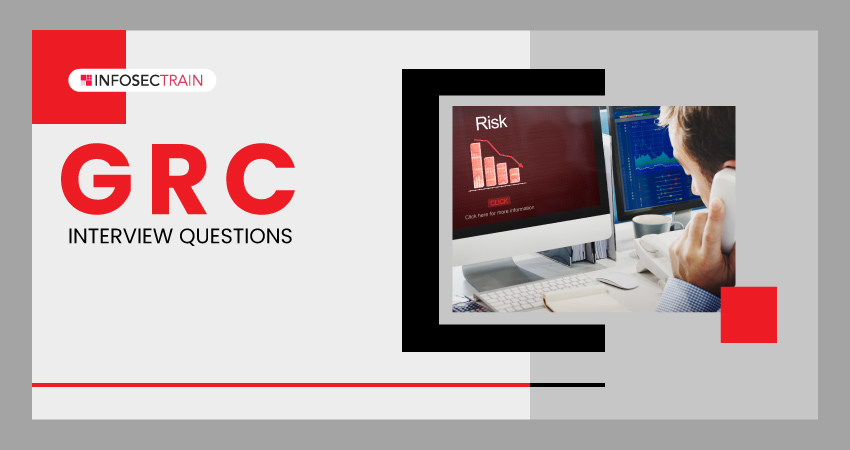Governance, Risk, and Compliance (GRC) Interview Questions
Organizations today understand the crucial need for Governance, Risk, and Compliance (GRC) functions to guarantee operational effectiveness, regulatory conformity, and risk reduction in the face of a dynamic business environment. This has led to a significant need for GRC professionals. Learning answers to typical GRC interview questions is an important part of being prepared to face a job interview in the GRC industry. Hopefully, you will be able to use the information in this article to ace your next GRC interview and land your ideal job.

GRC Interview Questions and Answers:
Question 1: There is a new regulatory requirement that must be followed in the field you work in. How would you get everyone in your company to comply with this requirement?
Answer: To ensure compliance with a new regulatory requirement within our organization, I would take the following steps:
- Thoroughly study the new requirement: Understand its scope, objectives, and specific compliance obligations.
- Assess the impact: Determine how the requirement affects our existing processes, policies, and systems.
- Develop a compliance plan: Identify necessary changes, assign responsibilities, and set deadlines for implementation.
- Communicate and train: Educate employees about the new requirement, its implications, and their individual responsibilities.
- Update policies and procedures: Revise existing documentation to align with the new requirement and establish clear guidelines.
- Implement monitoring mechanisms: Put in place regular audits and checks to ensure ongoing compliance.
- Maintain documentation: Keep records of compliance activities, changes made, and evidence of adherence to the requirement.
- Stay informed and adapt: Continuously monitor updates and changes to the requirement, adjusting our compliance efforts accordingly.
Question 2: A business unit is experiencing a significant increase in data privacy-related consumer complaints. How would you investigate and address this issue from a GRC standpoint?
Answer: From a GRC perspective, I would investigate and address the increase in customer complaints related to data privacy by:
- Conducting a thorough review of data privacy policies and procedures.
- Assessing data handling practices for compliance with regulations.
- Identifying any gaps or vulnerabilities in data privacy controls.
- Implementing corrective actions to address the issues, including employee training, process improvements, and enhanced monitoring.
- Regularly monitoring and reviewing the effectiveness of implemented measures to ensure ongoing compliance and customer satisfaction.
Question 3: An entirely novel project involving significant technological changes is being initiated. How would you guarantee that the project adheres to regulatory requirements, risk management standards, and compliance frameworks?
Answer: To ensure that a new project involving significant technological changes aligns with regulatory requirements, risk management standards, and compliance frameworks:
- Conduct a comprehensive regulatory analysis to identify applicable laws and regulations.
- Perform a risk assessment to identify potential risks and develop mitigation strategies.
- Integrate compliance requirements into project planning and design.
- Implement robust controls and monitoring mechanisms to ensure ongoing compliance.
- Engage with relevant stakeholders, including legal, compliance, and risk management teams, throughout the project lifecycle to address any compliance concerns.
Question 4: A cyberattack has compromised sensitive consumer information. What steps would you take to evaluate the impact, mitigate the risks, and ensure compliance with applicable data protection regulations?
Answer: In the event of a cyberattack compromising sensitive customer data, the following steps can be taken to assess the impact, mitigate risks, and ensure compliance with relevant data protection regulations:
- Activate incident response plan
- Assess scope and impact
- Notify relevant stakeholders
- Engage forensic experts
- Mitigate immediate risks
- Conduct risk assessment
- Implement remedial measures
- Review and update data protection policies
- Communicate with customers and stakeholders
- Collaborate with regulatory authorities
- Conduct post-incident review
- Monitor and audit for ongoing compliance
Question 5: A security breach has been discovered at a third-party vendor that your company relies on for vital services. How would you go about managing the risks that come with this incident and ensuring that the vendor complies with all of the security standards?
Answer: To manage risks associated with a third-party vendor’s security breach and ensure compliance with security standards:
- Activate the incident response plan, involving internal and external stakeholders.
- Assess the impact of the breach on our organization and customer data.
- Collaborate with the vendor to investigate the incident, identify vulnerabilities, and implement remediation measures.
- Conduct an audit of the vendor’s security practices, including compliance with relevant security standards.
- Establish stronger security controls and monitoring mechanisms for ongoing vendor management and risk mitigation.
Question 6: We have received a whistleblower complaint about possible fraud in one of our departments. How would you approach it so that an unbiased investigation could be conducted while also maintaining confidentiality and preventing reprisal?
Answer: To handle a whistleblower complaint alleging potential fraud within a department:
- Treat the complaint with utmost seriousness and initiate an impartial investigation.
- Ensure confidentiality of the whistleblower’s identity, implementing necessary safeguards.
- Implement anti-retaliation measures to protect the whistleblower.
- Conduct a thorough investigation involving relevant stakeholders and utilizing forensic experts if required.
- Take appropriate disciplinary or corrective actions based on investigation findings, ensuring transparency and adherence to legal requirements.
Question 7: A new business opportunity necessitates forming a partnership with a company situated in a high-risk jurisdiction infamous for corruption. How would you evaluate the associated risks and design a compliance framework to mitigate those risks?
Answer: To assess and mitigate risks when entering a partnership with a company in a high-risk jurisdiction known for corruption:
- Conduct due diligence on the potential partner, assessing their reputation, financial stability, and compliance history.
- Engage legal and compliance experts to evaluate the local legal and regulatory environment.
- Develop a robust compliance framework, including anti-corruption policies, training programs, and strict monitoring mechanisms.
- Establish clear contractual provisions and safeguards to mitigate corruption risks.
- Implement ongoing monitoring and auditing to ensure compliance and detect any irregularities.
Question 8: Several violations of compliance were discovered during a regulatory audit. How would you collaborate with the appropriate stakeholders to create and implement corrective action plans to ensure long-term compliance?
Answer: To collaborate with stakeholders and address non-compliance issues identified in a regulatory audit:
- Engage relevant stakeholders to understand the root causes of non-compliance.
- Develop corrective action plans with clear responsibilities and timelines.
- Regularly communicate progress, provide necessary training, and establish monitoring mechanisms.
- Continuously evaluate and improve processes to ensure sustainable compliance in the long term.
Question 9: An innovative business process involving automation and AI technologies is being implemented. How would you evaluate the ethical and compliance implications of these technologies and determine the best governance practices?
Answer: The following are a few steps to assess the ethical and compliance implications of implementing automation and AI technologies:
- Conduct an ethics impact assessment to identify potential risks and biases.
- Evaluate compliance requirements and ensure alignment with relevant regulations and standards.
- Establish governance measures, including clear policies, transparency, accountability, and regular audits.
- Implement mechanisms for ongoing monitoring and evaluation to address emerging ethical and compliance concerns.
Question 10: A comprehensive risk analysis conducted within the organization revealed a potentially disastrous financial fraud event. In what ways could this risk be reduced and continuous compliance ensured if controls were designed and implemented?
Answer: To design and implement controls for mitigating the high-risk areas related to financial fraud:
- Conduct a detailed analysis of the identified risk, including its root causes and potential impact.
- Develop and implement preventive controls, such as segregation of duties, regular reconciliation, and automated monitoring systems.
- Establish robust detection controls, including fraud detection algorithms, data analytics, and periodic internal audits.
- Implement stringent access controls and authorization mechanisms.
- Conduct regular training and awareness programs for employees to recognize and report fraudulent activities.
- Continuously monitor and review controls for effectiveness, making necessary adjustments to address emerging risks and ensure ongoing compliance.
Master GRC with InfosecTrain:
Preparing for a GRC interview requires a comprehensive understanding of the field, including Governance, Risk management, Compliance, and the ability to communicate and collaborate across departments effectively. You can show your knowledge and aptitude for a GRC post by practicing for the aforementioned interview questions. It is important to be well-prepared with answers that highlight your experience, problem-solving abilities, and dedication to preserving a robust GRC framework.
InfosecTrain’s various training courses offer comprehensive GRC knowledge and practical skills for interview success. Gain expertise in Governance, Risk, and Compliance with our industry-leading program. You can enroll now in the courses mentioned below to excel in your GRC interview:
- Certified Information Security Manager (CISM)
- Certified Information Systems Auditor (CISA)
- Certified Information Systems Security Professional (CISSP)
- Payment Card Industry Data Security Standard (PCI-DSS)
- GRC RSA Archer
- Information System Auditor (Practical Approach)
We hope you have a successful interview!
TRAINING CALENDAR of Upcoming Batches For RSA Archer
| Start Date | End Date | Start - End Time | Batch Type | Training Mode | Batch Status | |
|---|---|---|---|---|---|---|
| 01-Jun-2024 | 30-Jun-2024 | 19:00 - 22:00 IST | Weekend | Online | [ Open ] |




 1800-843-7890 (India)
1800-843-7890 (India) 
